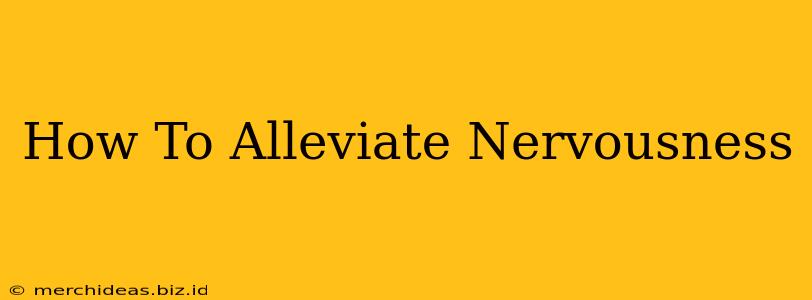Feeling nervous? You're not alone. Nervousness is a common human experience, triggered by everything from big presentations to first dates. While a little anxiety can be motivating, excessive nervousness can be debilitating. This guide provides practical techniques to alleviate nervousness and regain control of your feelings.
Understanding the Roots of Nervousness
Before diving into solutions, it's helpful to understand what causes nervousness. Nervousness is your body's natural "fight-or-flight" response, preparing you for perceived danger. This response involves physical symptoms like:
- Increased heart rate: Your heart beats faster to pump more blood to your muscles.
- Rapid breathing: Your breathing becomes quicker and shallower.
- Sweaty palms: Your sweat glands produce more sweat to cool your body down.
- Muscle tension: Your muscles tense up in preparation for action.
- Shaking: Your body might tremble due to the adrenaline rush.
These symptoms can be triggered by various factors including:
- Stressful situations: Work deadlines, exams, public speaking.
- Social anxiety: Fear of social interaction or judgment.
- Specific phobias: Irrational fears of certain objects or situations.
- Underlying medical conditions: Anxiety disorders or other health issues.
Understanding the source of your nervousness can help you tailor your coping strategies more effectively.
Proven Techniques to Alleviate Nervousness
Now let's explore practical techniques to manage and alleviate nervousness:
1. Deep Breathing Exercises
Deep, slow breathing is a powerful tool to calm your nervous system. When you're nervous, your breathing becomes shallow and rapid. Deep breathing helps slow your heart rate and reduce muscle tension. Try this:
- Inhale slowly and deeply through your nose, filling your lungs completely.
- Hold your breath for a few seconds.
- Exhale slowly and completely through your mouth.
- Repeat several times.
Practicing deep breathing regularly can significantly reduce your anxiety levels over time.
2. Progressive Muscle Relaxation
This technique involves systematically tensing and releasing different muscle groups in your body. By consciously releasing tension, you can reduce overall muscle stiffness and anxiety. Start with your toes, progressively working your way up to your head, tensing each muscle group for a few seconds and then releasing.
3. Mindfulness and Meditation
Mindfulness techniques, such as meditation, can help you focus on the present moment and reduce overthinking about future anxieties. Regular meditation practice can significantly improve your ability to manage stress and nervousness. Even a few minutes a day can make a difference.
4. Physical Activity
Exercise is a fantastic stress reliever. Physical activity releases endorphins, which have mood-boosting effects. Whether it's a brisk walk, a yoga session, or a workout at the gym, find an activity you enjoy and make it a regular part of your routine.
5. Cognitive Behavioral Therapy (CBT) Techniques
CBT techniques help you identify and challenge negative thoughts and beliefs that contribute to anxiety. A therapist can guide you through this process, helping you develop more adaptive coping mechanisms.
6. Lifestyle Changes
Certain lifestyle choices can exacerbate nervousness. Consider these adjustments:
- Get enough sleep: Aim for 7-9 hours of quality sleep per night.
- Eat a healthy diet: Avoid excessive caffeine and alcohol.
- Limit screen time: Reduce exposure to stressful news and social media.
When to Seek Professional Help
While these techniques can be highly effective, it's crucial to seek professional help if your nervousness is severe, persistent, or significantly impacting your daily life. A therapist can diagnose any underlying anxiety disorders and provide personalized treatment plans. Don't hesitate to reach out for support when you need it.
Keywords: alleviate nervousness, reduce anxiety, calm nerves, stress relief, anxiety management, deep breathing exercises, progressive muscle relaxation, mindfulness meditation, physical activity, CBT techniques, healthy lifestyle, mental health.
